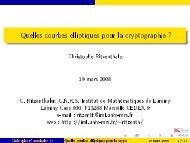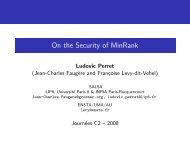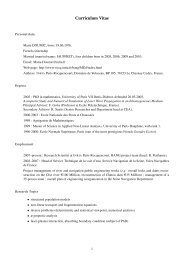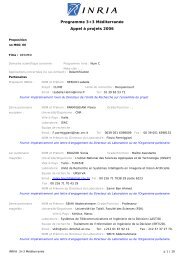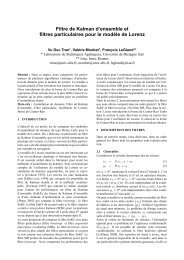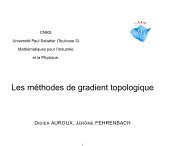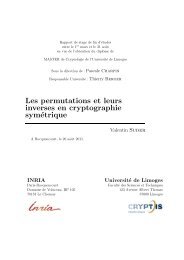Verdandi: generic library for data assimilation
Verdandi: generic library for data assimilation
Verdandi: generic library for data assimilation
You also want an ePaper? Increase the reach of your titles
YUMPU automatically turns print PDFs into web optimized ePapers that Google loves.
<strong>Verdandi</strong><br />
<strong>Verdandi</strong>: <strong>generic</strong> <strong>library</strong> <strong>for</strong> <strong>data</strong> <strong>assimilation</strong><br />
July 2012<br />
1/12
Introduction to <strong>Verdandi</strong><br />
<strong>Verdandi</strong><br />
Co-developed with EPI MACS<br />
Licence : GNU LGPL<br />
Languages : C++, Python<br />
Introduction<br />
Version history<br />
Python interface<br />
Multi plat<strong>for</strong>m : Linux, MacOS, Windows<br />
Objective : providing methods and tools <strong>for</strong> <strong>data</strong> <strong>assimilation</strong>, designed<br />
to be relevant to a large class of problems involving high-dimensional<br />
numerical models (meteorology, oceanography, numerical heart<br />
modelling, ...).<br />
2/12
Benefits and users<br />
<strong>Verdandi</strong><br />
Introduction<br />
Version history<br />
Python interface<br />
Faciliate the application of methods to a great number of problems.<br />
Provide a framework <strong>for</strong> perennial development, improving the<br />
diffusion of codes.<br />
Potential users :<br />
Specialists who will take advantage of the robust framework.<br />
Non specialists who can directly use the available <strong>data</strong> <strong>assimilation</strong><br />
methods in <strong>Verdandi</strong>.<br />
3/12
<strong>Verdandi</strong><br />
Introduction<br />
Version history<br />
Python interface<br />
NO2 concentration at Clermont-Ferrand (10/07/2008)<br />
Forecast model without <strong>assimilation</strong>. Forecast model with <strong>assimilation</strong>.<br />
4/12
Conception<br />
<strong>Verdandi</strong><br />
Introduction<br />
Version history<br />
Python interface<br />
Simple example of a sequential <strong>data</strong> <strong>assimilation</strong> algorithm :<br />
x a h is the analysis vector, computed from <strong>data</strong> <strong>assimilation</strong> A, x f h the<br />
background state vector. Mh is the numerical model.<br />
For every time th, if observations oh are available :<br />
x a h = A(x f h , oh)<br />
x f h+1 = Mh(x a h )<br />
Assimilation methods A are <strong>generic</strong> and can be writter independantly of<br />
the system to which they are applied. They can there<strong>for</strong>e be put<br />
together in a <strong>library</strong>.<br />
Some methods available in <strong>Verdandi</strong> : optimal interpolation, Kalman<br />
filters, four dimensional variational...<br />
5/12
Conception<br />
Language : C++<br />
Three main objects<br />
A model<br />
<strong>Verdandi</strong><br />
An observation manager<br />
An <strong>assimilation</strong> method<br />
which uses the other two<br />
objects to compute the<br />
simulation<br />
Introduction<br />
Version history<br />
Python interface<br />
Model<br />
Obs.<br />
Method<br />
6/12
Python<br />
<strong>Verdandi</strong><br />
Introduction<br />
Version history<br />
Python interface<br />
With SWIG we can generate a high level Python interface.<br />
In [1]: import verdandi<br />
In [2]: oi = verdandi.Method1()<br />
In [3]: method.Initialize(conf_file)<br />
In [4]: oi.InitializeStep()<br />
In [5]: method.Forward()<br />
In [6]: method.Analyze()<br />
Python interface<br />
<strong>Verdandi</strong>::OptimalInterpolation<br />
driver;<br />
driver.Initialize(conf_file);<br />
driver.InitializeStep();<br />
driver.Forward();<br />
driver.Analyze();<br />
C++ interface<br />
7/12
<strong>Verdandi</strong><br />
Some main changes by version<br />
0.9/1.0 (05/2011)<br />
Introduction<br />
Version history<br />
Python interface<br />
Added an implementation of the 4D-Var method<br />
Largely improved the compatibility with Visual C++<br />
Large improvement of the online documentation<br />
1.1 (10/2011)<br />
Added an implementation of the ensemble Kalman filter<br />
Made the SWIG interface compatible with Windows<br />
8/12
1.2 (03/2012)<br />
<strong>Verdandi</strong><br />
Introduction<br />
Version history<br />
Python interface<br />
Added the possibility to use a model and an observation manager<br />
written in Python<br />
Add of an interface <strong>for</strong> Petsc, which enables to manage parallel<br />
<strong>data</strong> structures in models and observations<br />
Added sequential aggregation <strong>for</strong> ensemble <strong>for</strong>ecasting with<br />
discounted ridge regression<br />
1.3 (06/2012)<br />
Final modifications on the model and observations interfaces<br />
9/12
<strong>Verdandi</strong><br />
Current applications of <strong>Verdandi</strong><br />
Image <strong>assimilation</strong> (EPI CLIME)<br />
Introduction<br />
Version history<br />
Python interface<br />
Air quality (NUMTECH, INERIS, AirParif, IRSN)<br />
Sequential aggregation <strong>for</strong> meteorology (EPI CLASSIC,<br />
NUMTECH)<br />
Medical simulation (EPI MACS, EPI ASCLEPIOS, Stan<strong>for</strong>d<br />
university, euHeart Project)<br />
Reduced minimax filter (Kiev univeristy, IBM research)<br />
10/12
Some works in progress<br />
<strong>Verdandi</strong><br />
Introduction<br />
Version history<br />
Python interface<br />
Creation of a test module to check if a model has been correctly<br />
interfaced with <strong>Verdandi</strong><br />
Carry on the work on parallelization : methods should be able to<br />
run in parallel with parallel models<br />
Compatibility with the HDF5 <strong>for</strong>mat <strong>for</strong> input/output files<br />
Add some algorithms/tools specifics to image <strong>data</strong> <strong>assimilation</strong><br />
11/12




